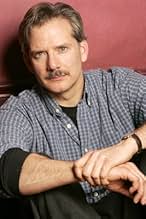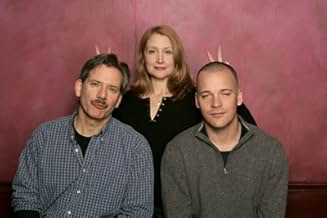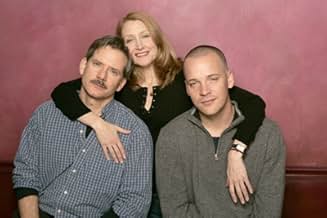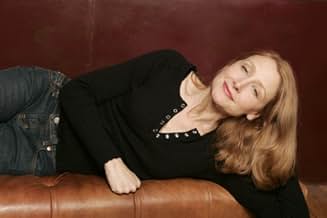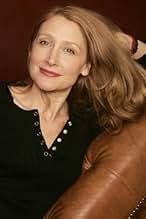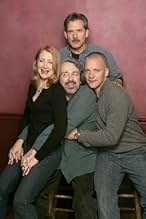IMDb रेटिंग
6.4/10
2.5 हज़ार
आपकी रेटिंग
अपनी भाषा में प्लॉट जोड़ेंA grief-stricken screenwriter unknowingly enters a three-way relationship with a woman and her film executive husband - to chilling results.A grief-stricken screenwriter unknowingly enters a three-way relationship with a woman and her film executive husband - to chilling results.A grief-stricken screenwriter unknowingly enters a three-way relationship with a woman and her film executive husband - to chilling results.
- पुरस्कार
- 1 जीत और कुल 2 नामांकन
Craig Hamrick
- Party Guest
- (वॉइस)
- (बिना क्रेडिट के)
Jason-Shane Scott
- Robert's Masseuse
- (बिना क्रेडिट के)
Bridgetta Tomarchio
- Female Guest
- (बिना क्रेडिट के)
फ़ीचर्ड समीक्षाएं
Somehow, this movie managed to hold my interest despite the fact that I never really cared about the characters or what was going to happen to them next. It's not a love story. Not a very good relationship tale. Not a mystery or thriller. Instead, Dying Gaul is a modern day Greek tragedy that uses Hollywood and homosexuality as simply vehicles to generate interest.
This is Craig Lucas' first time in the director's chair. He wrote The Secret Lives of Dentists (previously at Sundance, starring Patricia Clarkson). The movies tackle the same themes---the value and meaning of marriage, the impact of dalliances, the complexities of finding happiness and satisfaction without veering from tradition. But Dying Gaul comes at it with a different orientation, and even outcome.
Patricia Clarkson is always excellent, but here she shows a little evil in her character, which is outside her normal range. Unfortunately, the rest of the cast comes off as wooden, certainly uninspired. Pay attention, because there are liberal doses of philosophy in the form of quotes and counsel. But the real tragedy here is the lack of a meaningful story or compelling characters.
This is Craig Lucas' first time in the director's chair. He wrote The Secret Lives of Dentists (previously at Sundance, starring Patricia Clarkson). The movies tackle the same themes---the value and meaning of marriage, the impact of dalliances, the complexities of finding happiness and satisfaction without veering from tradition. But Dying Gaul comes at it with a different orientation, and even outcome.
Patricia Clarkson is always excellent, but here she shows a little evil in her character, which is outside her normal range. Unfortunately, the rest of the cast comes off as wooden, certainly uninspired. Pay attention, because there are liberal doses of philosophy in the form of quotes and counsel. But the real tragedy here is the lack of a meaningful story or compelling characters.
Despite the earnest work of three talented actors, "The Dying Gaul" is a slow and ponderous film that betrays its stage origins. Unfortunately, the film opens with a scene that seems improbable, if not downright impossible, as a film producer attempts to purchase an original screenplay from a first-time writer who plays coy over principles, despite a million-dollar carrot. Before long, the producer seduces the writer, and the two men carry on an illicit affair behind the back of the producer's wife. However, the wife is intrigued after meeting the writer, and she begins to correspond with him in on-line chat rooms under the guise of a gay man. The sham that the wife uses to uncover the affair and psychologically harass the young writer would not fool anyone, let alone an educated writer, and the film falls apart from lack of credibility. Although Hitchcock may have been able to make lengthy scenes of two characters instant-messaging each other over a computer into classic cinema, director Craig Lucas has yet to hone those skills, and the instant-messaging exchanges are leaden to be polite. Fortunately, my watch has a dial that illuminates in the dark. The direction of the film in general is slowly paced, and there is little visual excitement or breaking through the boundaries of the stage-bound dialog.
Fortunately, the always-wonderful Patricia Clarkson plays the wife, and she does wonders with a part that is not intrinsically interesting. While Peter Sarsgaard generally falls into the "always-wonderful" category as well, his subtly mincing shtick as the gay writer seems as though it were lifted from the worst episodes of "Will and Grace." Sarsgaard played a gay (or bisexual) man far more convincingly in "Kinsey." While there certainly are effeminate and fey gay men, those stereotypes have already been played to death on screen, and a fresher concept would have been expected of an actor with the talents of Sarsgaard. Campbell Scott plays his part well, although, when a viewer's mind wanders to thoughts of how well Scott is aging, the actor is apparently not fully engaging the audience's attention.
"The Dying Gaul," while not a complete failure, is nonetheless a disappointment and little more than an acting exercise for three talented performers. The wordiness and leisurely pacing may have worked on stage, and the flimsy plot devices may also have played more credibly in the theater. However, on film, "The Dying Gaul" fails to engage or convince and ultimately falls flat.
Fortunately, the always-wonderful Patricia Clarkson plays the wife, and she does wonders with a part that is not intrinsically interesting. While Peter Sarsgaard generally falls into the "always-wonderful" category as well, his subtly mincing shtick as the gay writer seems as though it were lifted from the worst episodes of "Will and Grace." Sarsgaard played a gay (or bisexual) man far more convincingly in "Kinsey." While there certainly are effeminate and fey gay men, those stereotypes have already been played to death on screen, and a fresher concept would have been expected of an actor with the talents of Sarsgaard. Campbell Scott plays his part well, although, when a viewer's mind wanders to thoughts of how well Scott is aging, the actor is apparently not fully engaging the audience's attention.
"The Dying Gaul," while not a complete failure, is nonetheless a disappointment and little more than an acting exercise for three talented performers. The wordiness and leisurely pacing may have worked on stage, and the flimsy plot devices may also have played more credibly in the theater. However, on film, "The Dying Gaul" fails to engage or convince and ultimately falls flat.
I enjoyed this film, up to a point- and that point was almost exactly the half way mark, where the writer director chose to go the maudlin implausible route instead of sticking with what he had, which was wonderful.
To have three characters in conflict and resolve it without any fancy plot device would have been truly courageous, but sadly what started out so lovely descended into melodrama and tedium.
That being said, Craig Lucas is clearly a talent to watch, he did a marvelous job with the actors- particularly Peter Skaarsgard, who does wonderful work, and the script is smart and even touching in places.
Campbell Scott seemed miscast to me, wooden and distant at places but oddly brazen in others. I can't imagine a married studio executive actually touching and almost kissing a writer ON THE LOT. I found myself imagining what other actors would have done with the role, never a good sign. But then again, he was one of the producers, so Mr. Lucas had his hands tied.
All in all, the first act was so promising that I was angered by the way Lucas decided to end it.
To have three characters in conflict and resolve it without any fancy plot device would have been truly courageous, but sadly what started out so lovely descended into melodrama and tedium.
That being said, Craig Lucas is clearly a talent to watch, he did a marvelous job with the actors- particularly Peter Skaarsgard, who does wonderful work, and the script is smart and even touching in places.
Campbell Scott seemed miscast to me, wooden and distant at places but oddly brazen in others. I can't imagine a married studio executive actually touching and almost kissing a writer ON THE LOT. I found myself imagining what other actors would have done with the role, never a good sign. But then again, he was one of the producers, so Mr. Lucas had his hands tied.
All in all, the first act was so promising that I was angered by the way Lucas decided to end it.
"The Dying Gaul" feels like an updated "Who's Afraid of Virginia Woolf?" set in Hollywood instead of academia. But it gradually veers towards "Fatal Attraction" as the opening jabs at commercial film-making, with lots of name and title dropping that seem to be writer Craig Lucas's revenge on compromises he made for his successful "Prelude to a Kiss," give way to catastrophic psychological manipulation.
The initial Hollywood commentary is emphasized through the settings, as the movie producer, Campbell Scott, and his ex-writer/liberal activist/household and children manager wife, Patricia Clarkson, live in an extraordinary house with a rippling pool and ocean view. Their financial success is wielded like a weapon as the camera restlessly swoops around all their possessions, household help and scenic property. The emotional price he's paid for this is clear as Scott's "Jeffrey" could be in "Glengarry Glen Ross" (to drop film titles like he does) as he'll clearly do anything to seal a deal.
Peter Sarsgaard drives on to the studio lot and into their lives with a completely different character from his four other released films this year, with inflections and body language that only occasionally get a bit too flamboyant as affectations of an out gay writer discussing issues of sexuality in the movies and his late lover. His grief and need for human warmth is so palpable that it is even believable that after failing with psychological counseling and Buddhism to deal with it, he clutches at what used to be called spiritualism, here delivered through the internet, shown visually both in the written word and the actors talking to the camera like reading aloud from their computer screens, edited effectively in the best key scenes with real life.
Clarkson is wonderful as she morphs from busy housewife lounging in a fetching bikini, to curious dabbler in the dark side, to woman scorned and revengeful manipulator. She may be the Ultimate Scary Mother, sexy, maternal and controlling, who while distraught over violent video games goes after the psyche. Unusually for how such a triangle has been portrayed in films (and the film is specifically set in 1995 as perhaps a more innocent time), we also get brief, sympathetic insight on another woman similarly affected by the writer's selfish actions that puts Clarkson's "Elaine" in perspective as she could have been portrayed as more of a brittle harpy. But each character alternately attracts and repels us.
In his directing debut Lucas does not well serve his own script, adapted from his play, as it could have been a lot tauter in exploring the slippery slope of ethics in human relationships, that all it takes is that one small step to deceive or keep secrets before one falls into the well. There could have been a lot fewer arty scenes in silhouette, at sunset, across water.
The Steve Reich music throughout becomes more irritating than tension-inducing.
While the title has something to do with the writer's long monologue about the significance of the Roman sculpture as an artist's way to make victims sympathetic, one is left here more with the feeling that these three folks deserve each other, though the collateral damage left in their wake is a tragedy.
The initial Hollywood commentary is emphasized through the settings, as the movie producer, Campbell Scott, and his ex-writer/liberal activist/household and children manager wife, Patricia Clarkson, live in an extraordinary house with a rippling pool and ocean view. Their financial success is wielded like a weapon as the camera restlessly swoops around all their possessions, household help and scenic property. The emotional price he's paid for this is clear as Scott's "Jeffrey" could be in "Glengarry Glen Ross" (to drop film titles like he does) as he'll clearly do anything to seal a deal.
Peter Sarsgaard drives on to the studio lot and into their lives with a completely different character from his four other released films this year, with inflections and body language that only occasionally get a bit too flamboyant as affectations of an out gay writer discussing issues of sexuality in the movies and his late lover. His grief and need for human warmth is so palpable that it is even believable that after failing with psychological counseling and Buddhism to deal with it, he clutches at what used to be called spiritualism, here delivered through the internet, shown visually both in the written word and the actors talking to the camera like reading aloud from their computer screens, edited effectively in the best key scenes with real life.
Clarkson is wonderful as she morphs from busy housewife lounging in a fetching bikini, to curious dabbler in the dark side, to woman scorned and revengeful manipulator. She may be the Ultimate Scary Mother, sexy, maternal and controlling, who while distraught over violent video games goes after the psyche. Unusually for how such a triangle has been portrayed in films (and the film is specifically set in 1995 as perhaps a more innocent time), we also get brief, sympathetic insight on another woman similarly affected by the writer's selfish actions that puts Clarkson's "Elaine" in perspective as she could have been portrayed as more of a brittle harpy. But each character alternately attracts and repels us.
In his directing debut Lucas does not well serve his own script, adapted from his play, as it could have been a lot tauter in exploring the slippery slope of ethics in human relationships, that all it takes is that one small step to deceive or keep secrets before one falls into the well. There could have been a lot fewer arty scenes in silhouette, at sunset, across water.
The Steve Reich music throughout becomes more irritating than tension-inducing.
While the title has something to do with the writer's long monologue about the significance of the Roman sculpture as an artist's way to make victims sympathetic, one is left here more with the feeling that these three folks deserve each other, though the collateral damage left in their wake is a tragedy.
First off, the less you know about this movie before seeing it, the better. Go in clean. And just let it such you in. Here are a few things you CAN know. (a) The screenwriter/director, Craig Lucas, is gay but wrote his best known play, PRELUDE TO A KISS, about a straight relationship that has overtones of homosexuality. (b) Patricia Clarkson may be the finest actress of her age. She flits around the first 20 minutes of this movie in a bra and panties, toyingly svelt but with a panther-like quality you only realize later. (c) This is a movie without a protagonist or an antagonist -- or more accurate, a movie in which each of the main characters take turns at being the antagonist and protagonist. (d) Despite the gay aspects, this is really a movie about betrayal, and it is fiendishly mean (but in a good way). (e) Peter Sarsgaard has never looked handsomer. (f) That's all you need to know. See it.
क्या आपको पता है
- ट्रिवियाThe film is dedicated to writer/director Craig Lucas's best friend, playwright Tony Kushner.
- कनेक्शनFeatured in 2006 Glitter Awards (2006)
टॉप पसंद
रेटिंग देने के लिए साइन-इन करें और वैयक्तिकृत सुझावों के लिए वॉचलिस्ट करें
- How long is The Dying Gaul?Alexa द्वारा संचालित
विवरण
- रिलीज़ की तारीख़
- कंट्री ऑफ़ ओरिजिन
- आधिकारिक साइट
- भाषा
- इस रूप में भी जाना जाता है
- El gal moribund
- फ़िल्माने की जगहें
- उत्पादन कंपनियां
- IMDbPro पर और कंपनी क्रेडिट देखें
बॉक्स ऑफ़िस
- बजट
- $40,00,000(अनुमानित)
- US और कनाडा में सकल
- $3,42,747
- US और कनाडा में पहले सप्ताह में कुल कमाई
- $53,944
- 6 नव॰ 2005
- दुनिया भर में सकल
- $3,45,041
- चलने की अवधि1 घंटा 32 मिनट
- रंग
- ध्वनि मिश्रण
- पक्ष अनुपात
- 1.85 : 1
इस पेज में योगदान दें
किसी बदलाव का सुझाव दें या अनुपलब्ध कॉन्टेंट जोड़ें








